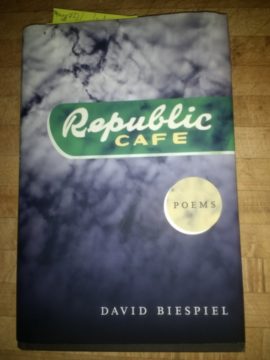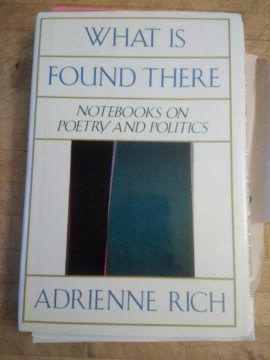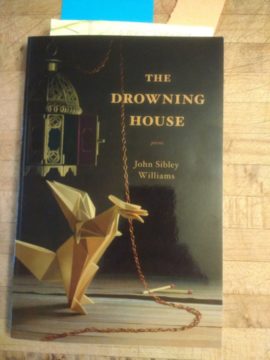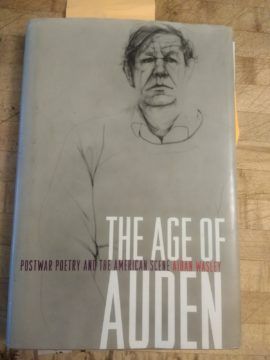by David Oates
 We sit in David Biespiel’s Republic Café: all of us together in the public space of democracy. It appeared in 2019, as American fascism made its perennial strut, less disguised than usual. At that point we’d endured two years of it. Lies spewed from the Leader’s mouth like flies from an open sewer, his followers enacting Hannah Arendt’s crisp formulation:
We sit in David Biespiel’s Republic Café: all of us together in the public space of democracy. It appeared in 2019, as American fascism made its perennial strut, less disguised than usual. At that point we’d endured two years of it. Lies spewed from the Leader’s mouth like flies from an open sewer, his followers enacting Hannah Arendt’s crisp formulation:
The ideal subject of totalitarian rule is not the convinced Nazi or the convinced Communist, but people for whom the distinction between fact and fiction (i.e. the reality of experience) and the distinction between true and false (i.e. the standards of thought) no longer exist. (The Origins of Totalitarianism, 1951, p. 474)
It felt to me that Republic Café was the book we were waiting for, offering confirmation that I wasn’t crazy – that our politics really were (and are) that bad. And as a book of poetry, its honest eloquence offered evidence that good sense and good will were everywhere around us, too. I was joining an invisible multitude. Not a mob. A quiet quorum. A universal café.
Or we join with John Sibley Williams in the twilight of The Drowning House. A new book, two years after Biespiel’s. And once again comes that recognition: Yes, this is it. This is what it feels like.
Every poem is a crisis. It stands between the self and the world, between pleasure and pain, privacy and exposure, simplicity and extravagance. It attempts to make one small thing – a line, a moment, a metaphor – beautiful and coherent. When it fails, we hate it. (Hatred of poetry is a topic all unto itself!
It always fails eventually. But when it succeeds, we become believers. At least a little, briefly.
* * *
The immediate context for Biespiel’s book (aside from the presidency that surrounded us all like a sickening gas) is quietly offered on the book’s cover art, which places the “Republic Café” sign of a classic old downtown Portland eatery against a wide-open sky gently patterned with high clouds. But off in one corner – so small you could cover it with a fingertip – the black silhouette of an airplane. A big one, high up. Strangely menacing.
For behind the many love lyrics of this book – and they are beautiful, sometimes just a few words long, or a stanza, or perhaps a page – behind these is the backdrop of our violent reality. Those airliners that crushed our ostensibly peaceable September morning.
And behind them, other crushings. Death camps, politics, wars. Even Hiroshima.
So Biespiel takes on the big question. Fearlessly, I’d say. What is beauty against such suffering? What is love?
Clouds like a white dog lying on its back with its paws pointed
upward
Clouds like jets blurring in flight,
Clouds like a lonely man wrestling with doubt where hope
is pushed against a bare tree and people sleep in the
dirty streets.
_______
We are sinners who know there are factories in the dark, and
meadows in the dark.
_______
The clouds are no surprise.
Danger and suffering do not always astonish us.
What liberates me as I read this book is that the writer is too wily to fall into the trap of “answering” the intermittent hell of history. He just poses questions. Juxtaposes them. Sometimes sketches a line or a half a line in response, incomplete, as if taking tentative thought-steps. The experience is all. And the question is everywhere.
But so are love and beauty, the inadequate/everlasting answer.
We awake in the cloud-filled hours with puddles of water
stained on the asphalt.
_______
Buoyed, in the middle of the room, we are like a small boat
alone on the water.
_______
History sighs in the open sea.
It is the quietness of this book that is its most remarkable achievement. In the margin I write, “This is stunning – a discourse of quiet questions, doubts, mere observation allowed to end without resolution.”
Because there can be no resolution, of course. Only the greatness of life and suffering. In Biespiel’s quietness is hidden a kind of confidence. I feel an inkling, an implication: that perhaps it is love that keeps it all going.
* * *
In this book, the personal analogue to history is memory. Which is also the denial of history: lovers in their own fragile bubble.
Desire is a conspiracy, I say –
We are both sitting under the window as the trees whiten in
the night.Desire causes two to be in defiance.
Two to be released from the pain of the world, two –
In the space of their own presence –
To be exempted.
Two, always, to threaten to vanish.
 The poet Adrienne Rich comments that, “In white North America, poetry has been set apart from the practical arts, from political meaning. . . thus, pushed to the margins of life.” In Biespiel’s book of poems (which I experience as a unity, a long poem in numbered sections), the opposite tactic is taken and memory pretty much is history, wound up in the same complications and paradoxes.
The poet Adrienne Rich comments that, “In white North America, poetry has been set apart from the practical arts, from political meaning. . . thus, pushed to the margins of life.” In Biespiel’s book of poems (which I experience as a unity, a long poem in numbered sections), the opposite tactic is taken and memory pretty much is history, wound up in the same complications and paradoxes.
Somewhere in the background of Republic Café there is the simplistic claim that history and its suffering must undo the personal (and thus the poetic), rendering them null. It’s a cry of pain that can certainly be sympathetically understood. But the philosopher and cultural critic Theodore Adorno has become a bit infamous for his pronouncement that, after the Nazi death camps, poetry was impossible – or in his word, “barbaric.” And Rich’s answer is tart, stinging:
“If taken at face value, it would mean a further desolation even than we have already had to face. Adorno, a German Jew who lived for many years as a refugee in the United States, may have forgotten the ancient role of poetry in keeping memory and spiritual community alive.” (What is Found There: Notebooks on Poetry and Politics, 1993, p. 141)
The personal survives even in the face of history’s devastations. If it did not, how are we here at all? Here. Here experiencing poetry, love, and pain. And behind those questions, the theodicy question – where then is God, if this has happened? The fact of hereness is a weighty answer, I think. One that poetry is uniquely equipped to assert, in all its quiet obliqueness.
How can anybody, you say, endure such pain?
I say, if there is a soldier’s body bleeding in the street, only the
sky can know it.
_______
But the sky is silent, you say.
A few swallows cooing, I say, that’s all.
In that moment your eyes are like a house
Being cleared out and emptied,
And the light is weak, like the inside of a memory,
That keeps surprising us at swirling moments
When something is given back
We didn’t know was ours, and with immense joy.
* * *
 John Sibley Williams’ The Drowning House explores our troubled political present – published in February 2021, the pandemic rolling along, and the question of politics having simmered (slightly) down in an electoral repudiation of the former regime (but weirdly catastrophized in the insurrectionary events of January 6, 2021, too recent to directly appear but casting an eerie light on the book’s struggles and insights).
John Sibley Williams’ The Drowning House explores our troubled political present – published in February 2021, the pandemic rolling along, and the question of politics having simmered (slightly) down in an electoral repudiation of the former regime (but weirdly catastrophized in the insurrectionary events of January 6, 2021, too recent to directly appear but casting an eerie light on the book’s struggles and insights).
The book’s three sections move from the general to the specific, from a disquieting view of our national sins and obsessions to the specific terrors of fatherhood, of bringing beloved children into a broken world.
* * *
This drowning house – how then shall we live in it? There’s something both dreamlike and nightmarish about the metaphor, an underwater quality to the light, the sound, the slo-mo of fear and loss.
I opened the first section (“My American Ghost”) in some trepidation. Because in poetry about politics there’s always the danger of ranting and finger-pointing, the wig-wag of righteousness. Williams avoids these pitfalls faithfully, reliably. Poem after poem braves the horrible and somehow stays afloat. A poem about Emmett Till, another about Trayvon Martin. A poem with the unforgettable title “The Dead Just Need to Be Seen. Not Forgiven.” And poems on the personal side too – fearfully so:
. . . We promise
our children the worldis forever, that this time
the wolves won’t show.
But of course they do, the wolves. The whole section’s aching exploration, its truth-telling and owning-up, pay off (for me) in the last poem, “My American Ghost.”
It’s a terse, tense poem, short lines chipping off metaphors like sparks that don’t burn bright enough to see by – only to feel by. “how sun-/light strikes a coin/differently after a train/flattens its face: another furious/daybreak lost behind clouds.” What can any of us do with this American past, that is (as Faulkner insisted) not past at all but with us at all times? Our refusal to see it turns it into a haunting. And like sensible middle-class folks, of course we don’t admit to any such thing.
& our mouths, nestfuls of promises,
we shall open them almost
fully: swallow & speak for what
we’ve swallowed: a whole
new language of witness.
It’s a good goal, a hopeful line: a whole new language of witness. Based on nestfuls of promises.
* * *
But these ghosts are not so easily exorcised. Reader, if you live in or near America (and surely we’ve implicated most of the world in America –) then you know that our denial of the past is our most remarkable trait. The way we always think a new day has dawned. That it’s those sad-sack Europeans who are mired in their pasts, their unfortunate historicisms. While we alone are free, whistling like Gerschwin’s American in Paris.
Williams calls out the delusion:
. . . Let’s
follow the Rorschach of blackbirds
with our crosshairs & choose
not to fire, or fire & own it. I confess
I don’t think we’re ready
just yet to own our ghosts.
* * *
As the book deepens, fatherland becomes father, a doubleness that invests many of these poems with a disturbing energy: the struggle with heritage writ into skin and bone. In the poem that gives the middle section its title (“No Good Night”), Williams implicitly engages two poetic fathers – Robert Frost, Dylan Thomas – in the same gesture as grappling with our political heritage. Admiration swirls together with frustration. I have been one acquainted with the night, he quotes. Then retorts: There is no good night. But the context is given in the title as César Chavez and the migrant worker rights movement. There’s an orchard, sweet fruit, dark hands reaching. The tensions do not resolve.
In this poem there’s a queasy collapse of the public and the personal. The “house” of this book becomes the “house divided” of Lincoln’s famous Bible quote. The house that cannot stand, the site of all too tangible waking nightmare in the book-title poem “The Drowning House.”
Like a good Portlander, Williams reports on a house under continuous rain (that’s how we feel, most years, from November through May). “The rain is a hood pulled over the world./Our neighbor’s house vanishes.” Our public distress is expressed in private addictions, wet basements, and resentful teenagers.
If the slot machines mommy pumps her grocery store
checks into makes the water there more potable, a reason.
If my brother picks another fight with someone whose name isn’t
quite like ours. . .
. . .If from these hills
I can witness
our home, consuming and being consumed.
Where do these “ifs” resolve? This is the teetering mess we live in, the nation that thinks itself an exception to the reality of history and the laws of nature.
* * *
In the last section, the catastrophe of politics becomes the precisely personal difficulty of fatherhood – a father’s fear for the future – haunted by the past. “I don’t know what to promise my children.”
It starts with a father’s very specific meditation about a troubling kid. The poem is a “self-portrait,” the point of view personal, immediate. A father’s fears. “It is my splintered cross to keep you safely distanced/ from humanity,” he admits. A promise he knows he can’t keep. In later poems he remembers his own father, mother.
And in an eerie image, the poet imagines piling up all the ancestors and all their homes – slave-owners, witches, holy men, gunslingers, grandfathers – into “a pyre our ancestors would be proud of.” But then the transforming gesture: “Let it scrape the sky raw. Like prayer. Babel./Then leave it unlit.” First the recognition, the hard work of knowing, of refusing to pretend to forget. Then the even harder work: refusing to burn. Refusing the grand, (self-) destructive gesture.
That’s the move that makes so much of the poetry in this book surprising and redemptive. For it is easy to denounce, to strut upon the moral high ground. But how hard to learn to live with the humans, their faults, their histories! Since they are you.
So Williams weaves his fearful, loving fatherhood into a remarkable series of concluding poems. A few of their titles I hope will draw you to this book: “Postscript for a Flyover Country.” “A Poem in which Everyone Survives until Dawn.” “Harps Strung with Gut Still Make Music After 2,000 Years.” “My Heart Is in the Mouth of Another Heart.”
And this one: “The Wolves Have Done Their Worst.” By this point, you have to believe the poet when he says “I don’t know what/ to promise my children . . .”
when the anchorwoman prophesizes rain & more rain
& if
there is any more rain the river will swallow the house
for good this time
when they are old enough to wear my face as a mask & then a country’s
* * *
The troubling question of promise comes to obsess the book, the poet/father casting about almost desperately to find a safe space for his children’s future. “Whatever it takes to bless a body back to innocence ,/ we want to witness./Our children must endure.”
Finally The Drowning House arrives at a hope/promise that somehow the true and beautiful use of language could lead – O utopia – to the healing of our broken body politic in this chilling evocation of the murder of George Floyd: “Breathe/ language. Remind me how breath can be a luxury. It takes/time for a genuflected knee to suffocate the sky.”
And in the collection’s concluding poem:
May the deer navigate this field of white crosses
& tiny windless flagsas if no one buried beneath has ever taken from them.
May we join the mice nesting in our bones
like rotten logs& raise our children safely shadowed
in grief.
Poetry that speaks truth – disruptive truth, unwelcome to placid citizens just trying to make nice and get by – is called prophetic: not just forecasting the future, but speaking enduring truth, bedrock truth. The kind that can’t be proven, yet which a sober person might elect to put some faith in.
Maybe it’s no more complicated than this: that, having been loved, there is the possibility that you, too could do it. Could extend love or its cousin lovingkindness or its third-cousins equality and decency. Those various names for democracy.
* * *
The most vividly remembered political poem of the last hundred years is surely W.H. Auden’s quiet, terrifyingly prophetic poem from the beginning of World War II: “September 1, 1939.” It reviews the dire events of that year and that “low dishonest decade” in which western democracies looked the other way while fascism armed itself, murdered its citizens, and began taking over neighboring nations.
It was written at the beginning of Auden’s American self-reinvention – from a bar on Fifty-Second Street in New York City (a scene Williams might depict in Edward Hopper light and shadow). Auden reviews the various lies of modern days: the corporatist delusion that finds meaning in hivelike obedience, and the self-delusion of the merely private, pleasure-seeking life. He’s good at this, one thinks, zinging everyone in sight. But I confess part of me sees a guy at a bar, grousing.
But when he gets to the business end of the poem, my resistance collapses
All I have is a voice
To undo the folded lie,
The romantic lie in the brainOf the sensual man-in-the-street
And the lie of Authority
Whose buildings grope the sky:
. . . We must love one another or die.
Right around this time, Auden also wrote the well-remembered “In Memory of W.B. Yeats,” with its chilling acknowledgment “Poetry makes nothing happen.” It’s a funny thing for a poet to admit, isn’t it?
Yet Auden draws a ringing conclusion affirming his activist hope and faith – still treasured by so many of us:
Defenseless under the night
Our world in stupor lies;
Yet, dotted everywhere,
Ironic points of light
Flash out wherever the Just
Exchange their messages:
May I, composed like them
Of Eros and of dust,
Beleaguered by the same
Negation and despair,
Show an affirming flame.
 The faith of these lines does not survive Auden’s American metamorphosis. The critic Aidan Wasley sketches the poet’s ensuing self-transformation:
The faith of these lines does not survive Auden’s American metamorphosis. The critic Aidan Wasley sketches the poet’s ensuing self-transformation:
While Auden begins as a firebrand, championing leftist political causes, enlisting poetry in the struggle against fascism, and experimenting with radical poetic forms, he ends his career as a devoutly apolitical aesthetic and cultural conservative. (The Age of Auden, 2011, p. 164)
I don’t know what malign demon takes English poets of liberal-hearted greatness and turns them into grumbling old conservatives. (Wordsworth also comes shudderingly to mind, another poetic radical turned deep-blue Tory in middle age.) Auden would go on to explicitly reject the hope and (let us note) spiritual radicalism of the poem. It’s worth tracking exactly by what logic he ends up trashing his best moment:
“Rereading a poem of mine . . . after it had been published, I came to the line “We must love one another or die” and said to myself: “That’s a damned lie! We must die anyway.” So, in the next edition, I altered it to “We must love one another and die.” This didn’t seem to do either, so I cut the stanza. Still no good. The whole poem, I realized, was infected with an incurable dishonesty – and must be scrapped.”
Reader, this revision is a tissue of bad faith. It is achieved by a wooden literalism, just the sin of my sophomore readers who can’t abide a metaphor. Surely “or die” cannot be taken to have meant “DIE NOW, IN THE FLESH.” The line is not, in fact, a comment upon literal mortality at all, but a comment on the life of the spirit. Plenty of living people have dead spirits. It’s the work of poetry to speak to the enlivened self, or if necessary to wake it up from deathlike slumber.
Auden’s literalism here is shocking. Apparently he is so desperate to discard his liberal self that he will commit even this transparent ploy. I think of similar language in the second book of Genesis, when the Lord declares the danger of the forbidden tree: “In the day that thou eatest thereof thou shalt surely die.” And did Eve die that day? Did Adam? And shall we carp, like niggling adolescents, “but you said…”
Literalism is fundamentalism. And its chief operation is to mistake metaphors as literal truths, and thus to miss their import. To miss what they have to say to the spirit.
The life of the spirit takes place in an expansive realm, where things turn into other things, where the last shall be first and the weakest turn out, mustard-seed-wise, to overturn all powers and potentates.
* * *
Our two books: one the work of a lover – who embraces at the margins of terror—and the other the work of a dad – who shows a surprising spiritual toughness. Each of them shocked by weakness, by vulnerability in a world of crushing power and cruelty. Each of them asserting the realness of the counterforce of love – that other world we live in that is of this world but invisible to it.
A poem is a crisis because life is a lynching and a burning bush. It’s hard to know the victims from the gods. But poetry pretends to know. Oh, how it knows. Cheeky, attempting the impossible. Sometimes succeeding.
Poems that foreground politics make the crisis of a poem more stark, more desperate. No way to hide in the garden of private feeling. And anyway, all gardens are political – their peace and withdrawal come at a price. To someone, somewhere. To read a poem in a garden, as one ought, is to fail (as always) to escape politics.
Sitting in a garden reading Republic Café, reading The Drowning House. Working through the crisis in miniature, the micro-crisis. Feeling the riptides of fear but also of possibility. Feeling, at a minimum, the commune of our crisis. Speaking its language.
Disclosure: Kelson Books, of which I am General Editor, has published several of David Biespiel’s nonfiction books. John Sibley Williams is currently Guest Poetry Editor there. I write about their work because I admire it.
